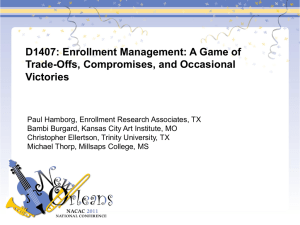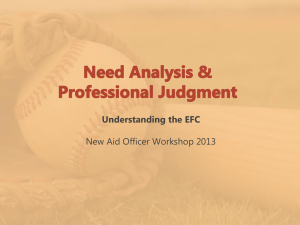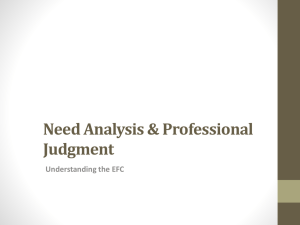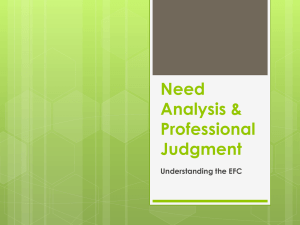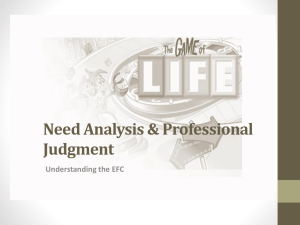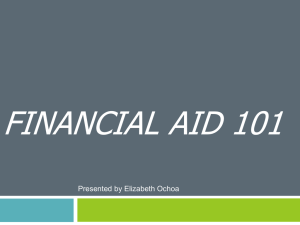How to Calculate EFC
advertisement
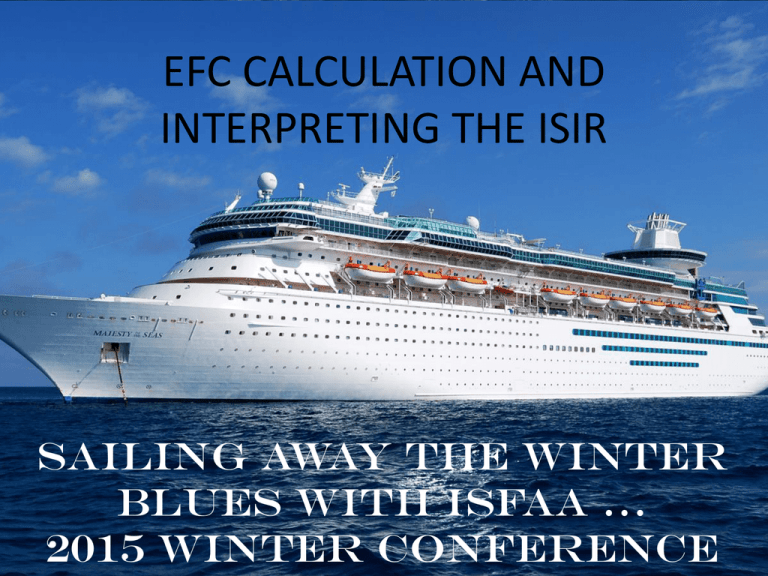
EFC CALCULATION AND INTERPRETING THE ISIR Sailing away the winter blues with ISFAA … 2015 Winter Conference SESSION OBJECTIVES Define basic EFC formulas Identify special calculations Differentiate between primary and secondary EFC’s Discuss intermediate values Complete an EFC hand calculation for a dependent student 2 EXPECTED FAMILY CONTRIBUTION The Department of Education defines EFC as “a measure of how much the student and his or her family can be expected to contribute to the cost of the student’s education for the year. It is a measure of a family’s financial strength based on income and assets”. • Considered a consistent method of evaluating financial situations among all applicants. 3 3 BASIC EFC FORMULAS Dependent Student Formula Independent Student Formula Independent Student Formula With Dependent(s) Other Than A Spouse 4 EFC CALCULATIONS Regular Simplified Formula (SNT) Automatic Zero EFC (Auto Zero) Alternate EFC’s (For Periods Other Than 9 Months) 5 SIMPLIFIED FORMULA (SNT) Assets are excluded from this EFC Calculation The parents were not required to file an IRS Form 1040 tax return (or) Anyone counted in the student’s household size received a means-tested federal benefit during 2012 or 2013 (or) One of the parents is a dislocated worker as defined in the Workforce Investment Act of 1998 6 SIMPLIFIED FORMULA (CONT) AND the dependent’s parents’ total AGI or income earned from work is less than $50,000 Same parameters apply to the Independent Student Formula except the household is that of the student’s (and spouse, if applicable) Use of Simplified Formula by CPS is denoted by a flag on the FAA Information Page of the ISIR: SNT Flag (Yes or No) 7 AUTOMATIC ZERO EFC The parents were not required to file an IRS Form 1040 tax return (or) Anyone counted in the student’s household size received a means-tested federal benefit during 2012 or 2013 (or) One of the parents is a dislocated worker as defined in the Workforce Investment Act of 1998 AND the dependent’s parents’ total AGI or income earned from work is $24,000 or less 8 AUTOMATIC ZERO EFC (CONT) Same parameters apply to the Independent Student Formula With Dependents Other than a Spouse except the household is that of the student’s An independent student must have dependents other than a spouse to be considered for an automatic zero EFC 9 AUTOMATIC ZERO EFC (CONT) If the CPS assigns an Automatic Zero EFC, this is denoted on the FAA Information Page of the ISIR The Auto Zero EFC Flag is either set to “Y” or it is blank 10 ALTERNATE EFCS Used to calculate financial aid for periods not equal to 9 months (summer school) ALWAYS, ALWAYS, ALWAYS use 9 month EFC to calculate Pell Grant eligibility Use of Primary and Secondary EFC 11 PRIMARY VS. SECONDARY EFC Primary EFC is always used in awarding Federal Aid Secondary EFC is only calculated when an applicant qualifies for SNT and still provides complete asset information – not likely to see with web skip logic Secondary EFC could be used in awarding institutional aid 12 WHY CAN’T WE JUST LET THE CPS CALCULATE THE EFC FOR US??? This will illustrate how each value on the FAFSA impacts EFC Gives a better understanding of how a special circumstance may or may not impact EFC Equips you to better answer all of those FAFSA questions you’ll be receiving over the next few months 13 INTERMEDIATE VALUES 21 Intermediate Values listed on the FAA Information Page of the ISIR 20 of those values are found in either the Dependent or Independent calculation The 21st value is FTI – FISAP Total Income 14 INTERMEDIATE VALUES • • • • • • • TI – Total Income ATI – Allowances Against Total Income STX – State and Other Tax Allowance EA – Employment Allowance IPA – Income Protection Allowance AI – Available Income CAI – Contribution from Available Income (Independent Calculation Only) 15 INTERMEDIATE VALUES (CONT) • DNW – Discretionary Net Worth • NW – Net Worth • APA – Education Savings and Asset Protection Allowance • PCA – Parents’ Contribution from Assets • AAI – Adjusted Available Income • TSC – Total Student’s Contribution • TPC – Total Parents’ Contribution • PC – Parents’ Contribution 16 INTERMEDIATE VALUES (CONT) • STI – Student’s Total Income • SATI – Student’s Allowance against Total Income • SIC – Dependent Student’s Income Contribution • SDNW – Student’s Discretionary Net Worth • SCA – Dependent Student’s Contribution from Assets • FTI – FISAP Total Income 17 EFC FORMULAS Found on IFAP @ www.ifap.ed.gov Located in the 2014-15 Federal Student Aid Handbook Application and Verification Guide Section 2013-14 Formulas are also available We will be using EFC Formula A (14-15): Dependent Student 18 EFC HAND CALCULATION!!! Get out your pencils and calculators (cell phones). It will take more than “a minute to win it” with a hand calculation…but you will build your financial aid skills in the process! 19 THE SCENARIO Our student, Clare Gopher, is a dependent student from Minnesota. Her parents are married and she has 1 sibling. Clare’s father turned 62 and he is the older parent. This past year, Clare filed a 1040 and had income earned from work of $1,415 and an AGI of $1,715. Clare paid no taxes and had $1,222 in her checking account at the time the FAFSA was filed. She had no other investments or untaxed income. 20 THE SCENARIO Clare’s parents both have full-time jobs with her father earning $36,000 and her mother earning $33,389. They filed a 1040 tax return reporting an AGI of $73,189 and taxes paid of $9,896. Additionally Clare’s parents also contributed $3,871 to a 401k and $13,000 to an IRA last year. At the time the FAFSA was filed, they reported assets of $69,168 in cash and savings accounts, $205,757 in investments and $4,272 in business/farm net worth. What is Clare’s EFC? 21 FIRST THINGS FIRST Does Clare qualify for the Simplified Needs Test or Automatic Zero EFC calculation? 22 3 STEPS IN CALCULATING PC Calculate Parents’ Available Income Calculate Parents’ Contribution from Assets Divide by the number in college 23 DEPENDENT STUDENT PARENT CALCULATION 24 PARENTS’ INCOME 25 ALLOWANCES AGAINST PARENTS’ INCOME 26 INCOME PROTECTION ALLOWANCE Found on Table A3 in the AVG 30% Amount = Food 22% Amount = Housing 9% Amount = Transportation 16% Amount = Clothing/Personal 11% Amount = Medical Care 12% Amount = Other Family Consumption 27 IPA BREAKDOWN FOR CLARE $8,049= Food $5,902= Housing $2,415= Transportation $4,293 = Clothing/Personal $2,951 = Medical $3,220 = Other Family Consumption $26,830 = Total IPA 28 PARENTS’ AVAILABLE INCOME & ASSETS 29 PARENTS’ CONTRIBUTION 30 2 STEPS IN CALCULATING STUDENT CONTRIBUTION Contribution from Available Income Contribution from Assets 31 STUDENT’S CONTRIBUTION 32 32 STUDENT’S INCOME CONTRIBUTION 33 STUDENT’S INCOME CONTRIBUTION (CONT.) 34 STUDENT INCOME Income Protection Allowance for a Dependent Student is $6,260 If a parents’ adjusted available income is negative, it will reduce the student’s contribution from income. It will not affect student’s contribution from assets 35 STUDENT CONTRIBUTION FROM INCOME 36 STUDENT’S ASSET CONTRIBUTION 37 STUDENT CONTRIBUTION FROM ASSETS Calculation differs from parent calculation in the following ways: No APA No adjustments to net worth of a business or investment farm Net worth assessed at 20% vs. 12% for parents 38 EXPECTED FAMILY CONTRIBUTION 39 DIFFERENCES IN INDEPENDENT STUDENT FORMULAS Different values for IPA – $9,730 for Independent Student; $15,600 for a married student if spouse isn’t enrolled ½ time Use of a table for IPA if the student has dependents other than spouse Adjusted Net Worth for a business or investment farm uses different tables – no adjustments for dependent students Asset Protection Allowance exists 40 THINGS TO CONSIDER: When the FAFSA was filed, all of the income earned from work was listed under 1 parent instead of both. How does this change the EFC? 41 THINGS TO CONSIDER: What happens when the student and parent change their state of legal residence to Wisconsin? What if they both change their state of legal residence to California? 42 MORE THINGS TO CONSIDER: How will the EFC change by increasing the net worth of the parents’ investments by $50,000? What if we add $4,800 in child support paid by the parents’ to this equation? 43 WHY DID WE LOOK AT THESE CHANGES IN THE SCENARIO? To demonstrate that values other than those that are required to be verified can impact EFC 44 A COUPLE OF WORDS ON PROFESSIONAL JUDGEMENT You can only modify values of data elements Be sure that adjustments aren’t covered by IPA Case-by-case basis only Cannot make formula adjustments Cannot adjust data elements just because you believe the formula isn’t treating a family fairly 45 FINAL WORD ON PROFESSIONAL JUDGEMENT DOCUMENT DOCUMENT DOCUMENT 46 CONTACT INFORMATION Kristi Fuller Assistant Director of Student Financial Planning Drake University Des Moines, Iowa 515-271-2779 kristi.fuller@drake.edu 47


